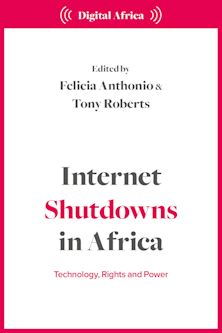- Home
- ACADEMIC
- Politics & International Relations
- Disinformation and Politics of the Internet
- Conspiracy Theories
This product is usually dispatched within 2-4 weeks
- Delivery and returns info
-
Flat rate of $10.00 for shipping anywhere in Australia
You must sign in to add this item to your wishlist. Please sign in or create an account
Description
Conspiracy theories are a part of the human condition. Everyone believes at least one, but given the number of conspiracy theories, it is more likely that everyone believes a few. Some people have a worldview defined by them. Conspiracy theories are just another reminder that people disagree about many things, including truth. These disagreements have always existed and always will. We have to live with conspiracy theories and with the people who believe them. The only way to do this is have compassion and tolerance for others, and to hold our own beliefs to high standards. This book introduces students to the research into conspiracy theories and the people who propagate and believe them. In doing so, it addresses the psychological, sociological, and political sources of conspiracy theorizing
Uscinski rigorously analyzes the most current arguments and evidence while providing numerous real-world examples so students can contextualize the current debates. Each chapter addresses important current questions, provides conceptual tools, defines important terms, and introduces the appropriate methods of analysis.
Table of Contents
About the Author
Chapter 1 Why Study Conspiracy Theories?
Chapter 2 What is a Conspiracy Theory?
Chapter 3 The Popularity of Conspiracy and Anomalous Beliefs
Chapter 4 The Psychology and Sociology of Conspiracy Theories
Chapter 5 The Politics of Conspiracy Theories
Chapter 6 President Trump, the Internet, Conspiracy, and Conspiracy Theory
Index
Product details
| Published | 15 Jan 2020 |
|---|---|
| Format | Paperback |
| Edition | 1st |
| Extent | 170 |
| ISBN | 9781538121207 |
| Imprint | Rowman & Littlefield Publishers |
| Dimensions | 227 x 154 mm |
| Publisher | Bloomsbury Publishing |
About the contributors
Reviews
-
Uscinski (Univ. of Miami) is a prolific scholar of conspiracy theory studies, a subfield that in recent years has blossomed in several disciplines. In this concise introduction to the academic approaches to this subject, the author aims to “introduce students to the latest research on conspiracy theories,” including polling numbers and research conducted by scholars in the two fields most invested in probing conspiracy theories: psychology and sociology. Scholarship on this topic in philosophy, history, and political science is also referenced. Other chapters explain the need to study conspiracy theories, defining the concept and the politics of these theories. Each chapter ends with a bibliography and list of key terms, and endnotes close the text. Since Uscinski focuses on research, readers will need to look elsewhere for details about the actual conspiracies (e.g., the Tuskegee syphilis experiment), conspiracy theories (e.g., the moon landing hoax, QAnon), and conspiracy theory tropes (e.g., false flags, sex-trafficking rings) mentioned throughout. Fortunately, sources for the book run from the most notable scholars to the most implausible conspiracists, and so the bibliography serves as a rich resource for newcomers to the topic. Summing Up: Recommended. All levels.
Choice Reviews
-
The first accessible and comprehensive guide to the research on conspiracy theories in contemporary society.
Martin Orr, Boise State University
-
Intriguing. Balanced and insightful.
Lee Basham, South Texas College/University of Texas, Rio Grande Valley
-
A good introduction to the current state of knowledge on who believes conspiracy theories and why.
Joanne Miller, University of Minnesota
-
Joe Uscinski knows the field better than anyone.
Kathryn Olmsted, Professor of History, University of California, Davis


































